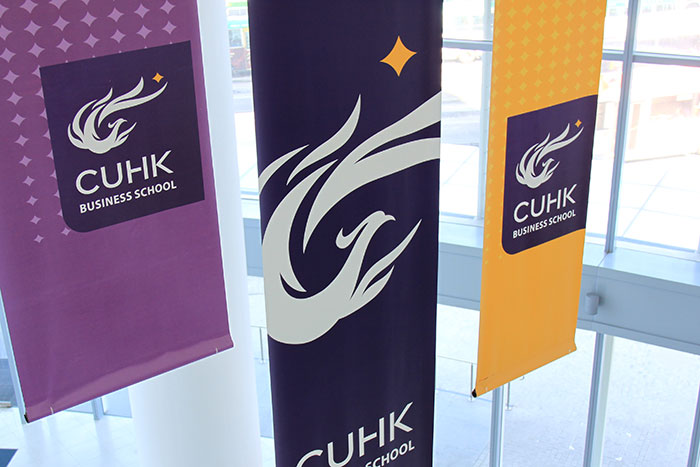CUHK MBA Broadens Curriculum to Meet Evolving Market Needs

Drivers of change in the finance sector, such as increasing levels of regulation, the need for improved efficiency, and a new generation of customers and technology, are creating a demand for professionals who can make a valuable contribution across an entire organisation.
Lawrence Chan, Chinese University (CUHK) administrative director (marketing and student recruiting) says MBA programmes play a vital role in helping professionals in the finance sector to move ahead in the industry by having the skills employers are looking for. “Besides knowledge about products, technology and regulatory issues, employers are always looking for individuals with leadership, soft skills, people management, cross cultural management abilities,” says Chan.
Alongside finance courses, Chan says CUHK MBA students study a variety of soft skills training programmes. They also receive training from consultants who work with multinational institutions. “Skills advancement and development are critical for long-term career development and help to strengthen the pool of talent working in the finance sector,” Chan says. To keep pace with evolving needs, Chan says the CUHK develops new courses, such as project financing, which is related to the future of infrastructure development in the Asia-Pacific region.
As the finance industry works to integrate the latest technology into their operating and service activities, Dean Stallard, regional director of recruitment firm Hays in Hong Kong, says finance technology candidates with an MBA are increasingly sought after by employers in the financial services industry. “If two candidates have like-for-like technical experience, cultural fit and other qualifications, then an MBA could be a differentiating factor,” says Stallard. On the job front, Stallard says opportunities in front office technology positions are currently strong in the investment banking sector. “’Chinese banks and the insurance sector also have large projects in the early stages, which are fuelling employment vacancy activity,” he says.
According to Tom Bain, adjunct professor of finance at CUHK business school, the significant increase in regulation of the financial sector has created an enormous burden for the industry. “Our MBA courses on financial markets must now include consideration of the significant loss in liquidity of certain instruments such as bonds, the increased role played by hedge funds, and potential risks to the execution of government monetary policy,” says Bain, adding that MBA students are still hungry to understand the movements of financial markets. Bain explains that financial markets are influenced by many factors including economic cycles, geopolitics, wars, technological developments, elections, weather, and natural disasters. “Students are keen to study these factors in order to interpret their impact and the steps they should take as managers to adapt to them,” he Bain…
Current student Alvin Tong also states that studying for an MBA program enhances his leadership skills before progressing further into management positions, as well as helps him tremendously in understanding the principles and philosophy behind the development of the Chinese economy as well as the Chinese government’s policy. Recently named the director of sponsorship for the 9th annual CUHK MBA Corporate Social Responsibility Conference on May 28, Tong has enriched his interpersonal skills by making presentations in a corporate boardroom setting.
“For students who have been in the workforce for a longer period like me, I feel that the MBA is more appropriate to enhance my leadership skills before progressing further into management positions,” says Tong, who also believes he is benefiting from his MBA programme focus on mainland China. “I feel that it has helped me tremendously to understand the principles and philosophy behind the development of the Chinese economy, and the government’s plans for gradual reforms and liberalisation,” adds Tong, who worked on a MBA project to understand China’s objectives in creating the Silk Road Fund and its involvement in the Asian Infrastructure Investment Bank. Moreover, Tong says the MBA programme has helped him develop tangible skills in financial modelling and valuation techniques, and determine the strength of cash flows generated by a corporation. Furthermore, in his role as CSR director, Tong has enriched his interpersonal skills by making presentations in a corporate boardroom setting.
CUHK MBA graduate Douglas Chan, who is an active member of the business school’s alumni, believes that becoming a successful leader in the global business world requires all-round knowledge covering many different areas. “From accounting and finance theories, to organisational management skills, I believe the CUHK MBA equips candidates with broader skills and knowledge and helps graduates apply them in many different situations,’” says Chan. A good example, he says, is the emphasis on teamwork. “A recent project I was working on involved colleagues from all over the world, which required a great deal of teamwork and excellent interpersonal skills,” says Chan. “My MBA experience definitely prepared me for this challenge,” he adds. With his pre-MBA career already in the finance industry, Chan says that joining the alumni has helped him further expand his connections across different industries. “Networking is another valuable asset for future career development,” he says.
Media: South China Morning Post
Section: Education Post
Date published: April 21, 2015

